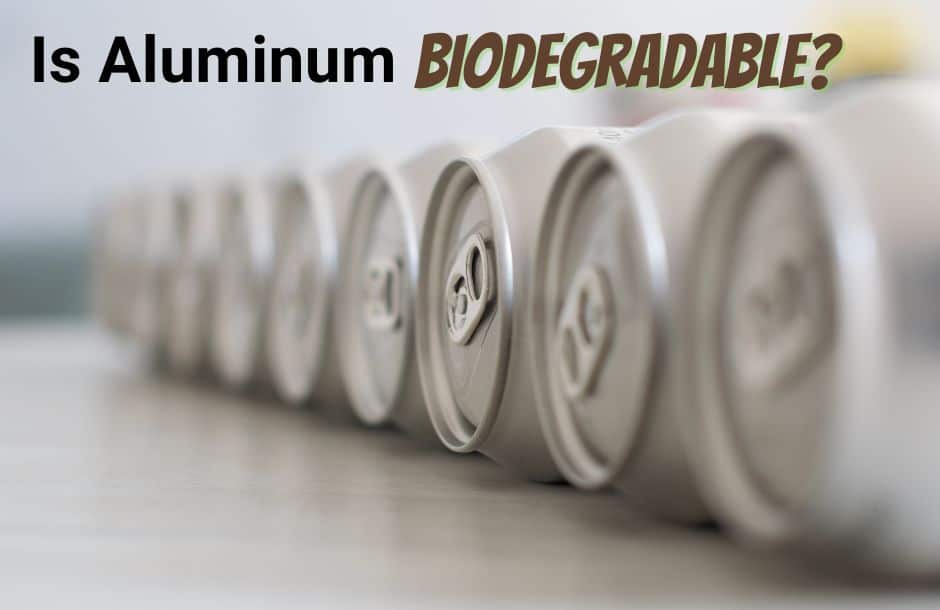Is Aluminum biodegradable?
Aluminum is a naturally occurring element that is found in abundance in the earth’s crust. It is a silvery white metal that is light in weight and has a very low density. Aluminum is non-toxic and is widely used in a variety of industries and applications.
Although aluminum is a very durable metal, it is not indestructible. When exposed to the elements, aluminum will eventually succumb to corrosion. This process can take many years, depending on the environment in which the aluminum is exposed.
While aluminum is not biodegradable, it can be recycled indefinitely without losing any of its properties. This makes aluminum a very sustainable material.
Aluminum is not biodegradable
Aluminum is not biodegradable and will remain in the environment indefinitely. While aluminum is not considered to be toxic, it can be harmful to the environment if not properly disposed of. When aluminum is incinerated, it releases harmful chemicals into the air that can be harmful to human health.
Why aluminum is not biodegradable
While aluminum cans are 100% recyclable, they are not biodegradable. This means that when they are thrown away, they will sit in landfills for years, slowly breaking down into smaller and smaller pieces. While this process is not harmful to the environment, it does mean that aluminum cans are a major source of litter.
Introduction to Aluminum
Aluminum is a chemical element with the symbol Al and atomic number 13. It is a silvery-white, soft, non-magnetic and ductile metal in the boron group. By mass, aluminum makes up about 8% of the Earth’s crust; it is the third most abundant element after oxygen and silicon and the most abundant metal in the crust, though it is less common in the mantle below. The chief ore of aluminum is bauxite. Alumina, or aluminum oxide, is the main component of aluminum. Metallic aluminum is produced by reducing alumina with sodium or magnesium in the Hall–Héroult process. This process was first discovered in 1886 by Charles Martin Hall and Paul Héroult.
Aluminum is remarkable for its low density and for its ability to resist corrosion due to the phenomenon of passivation. Structural components made from aluminum and its alloys are vital to the aerospace industry and are important in other areas of transportation and structural materials. Its reactive nature makes it useful as a catalyst or additive in chemical mixtures, including aqua regia and other strong acids.
Aluminum is a good conductor of heat and electricity. It is also a highly reflective material, so it is used in mirrors, reflecting sheets, and lamps. It is used in making cooking utensils, because it is a good conductor of heat. It is also used in making electric wires and cables because it does not corrode.
Some aluminum compounds are used as pigments, dyes, and other colorings. Aluminum sulfate is used in water purification, and aluminum chloride is used in the production of paper. Aluminum oxide is used as an abrasive and as a catalyst.
History of Aluminum
Aluminum is a relatively new metal that was first discovered in the early 1800s. It was not until the mid-19th century that aluminum began to be used commercially. The first aluminum products were made in the 1860s, and the metal quickly became popular for its light weight and resistance to corrosion. Today, aluminum is one of the most widely used metals in the world, with applications in a wide variety of industries.
Uses of Aluminum
Aluminum has a wide range of uses in different industries and sectors. It is used in the manufacturing of aircrafts, automobiles, beverage cans, etc. It is also used in the construction industry for making windows, doors, siding, etc. Aluminum is a very popular material due to its many benefits. Some of these benefits include being lightweight, strong, durable, and corrosion resistant.
The environmental impact of aluminum
Aluminum is the most abundant metal in the Earth’s crust, and it has a variety of applications in industry and consumer products. However, aluminum production and use also have an environmental impact.
Aluminum production requires a great deal of energy, and it results in emissions of greenhouse gases and other pollutants. Aluminum production also generates waste products, including bauxite residue (also known as red mud). Red mud is a hazardous waste product that can contaminate water and soil.
The recycling of aluminum cans and other aluminum products helps to reduce the environmental impact of aluminum production and use. Recycling aluminum requires only a fraction of the energy needed to produce new aluminum, and it reduces emissions of greenhouse gases and other pollutants.
How to recycle aluminum
Aluminum recycling is one of the most efficient ways to reduce greenhouse gas emissions and conserve energy. The process of recycling aluminum cans saves 95 percent of the energy required to make new cans from scratch.
Here are some tips on how to recycle aluminum:
- Rinse out your aluminum cans before recycling them.
- Separate aluminum cans from other types of recyclables.
- Check with your local recycling center to see if they accept aluminum cans.
- Crush your aluminum cans to save space in your recycling bin.
- Bring your aluminum cans to a local recycling center or drop them off at a community recycling event.
What Products are Made of Aluminum?
Aluminum is one of the most widely used metals in the world, with applications in a variety of industries. It is strong yet lightweight, making it an ideal material for a wide range of products. Here are just a few examples of what aluminum is used to make:
–Foil: Aluminum foil is used in a variety of applications, from food packaging to insulation.
–Cans: Aluminum cans are used to store a variety of food and beverage products.
–Windows and doors: Aluminum is a popular choice for windows and doors due to its durability and low maintenance.
–Vehicles: Aluminum is used in the construction of many vehicles, from cars to airplanes.
–Cookware: Aluminum is a popular choice for cookware due to its even heat distribution.
Aluminum in Everyday Life
Aluminum is one of the most common materials on earth. It is found in abundance in the earth’s crust and is used in a variety of products.
Aluminum is a light metal with a silvery-white appearance. It is strong, yet lightweight, and is a good conductor of heat and electricity. Aluminum is also corrosion-resistant, making it a popular choice for a variety of products.
Some of the most common products that are made of aluminum include aluminum foil, beverage cans, cooking pots and pans, siding, gutters, and window frames. aluminum is also used in the construction of airplanes, automobiles, and trains.
Aluminum is an important material in our everyday lives. It is durable, yet lightweight, and its unique properties make it ideal for a variety of uses.
Health and Environmental Concerns of Aluminum
There are many health and environmental concerns associated with aluminum. Some of these include:
-Aluminum is a known neurotoxin that can have negative effects on brain development and function.
-Exposure to aluminum has been linked to Alzheimer’s disease, Parkinson’s disease, and other neurological disorders.
-Aluminum is widely used in food and beverage packaging, and leaching of aluminum into food and drinks can occur.
-Aluminum has been found in breast milk, and some studies have suggested that aluminum exposure in infancy may be linked to later developmental problems.
-Aluminum is a known endocrine disruptor, and has been linked to problems such as reproductive difficulties, bone loss, and cognitive impairments.
-Aluminum is a major pollutant, and its production and use can have negative impacts on air, water, and soil quality.
Is aluminum eco-friendly?
Aluminum is a widely used metal that is found in a variety of applications. It is considered to be a very eco-friendly metal, but there are some factors to consider before making a final determination.
Aluminum is a very light metal that is non-toxic and doesn’t corrode. It is also very efficient to recycle and can be reused multiple times. This makes aluminum a very sustainable choice for many applications.
However, aluminum does require a lot of energy to produce, and this has led to some concerns about its eco-friendly credentials. In addition, the mining and refining of aluminum can produce harmful pollutants.
Overall, aluminum is a very sustainable metal that can be used in a variety of applications. However, it’s important to consider the environmental impacts of its production before making a final decision.

